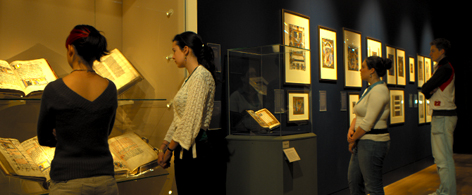A case study of a new Foundation Degree in Cultural Services
Rachel Pryor, Pathway leader for Foundation Degree in Cultural Services, Anglia Ruskin University, Faculty of Education, Cambridge.
Rachel.pryor@anglia.ac.uk
Conference themes selected:
- The role of museums in supporting HE student learning
- Museums and university partnerships – opportunities and barriers
Keywords: Cultural Sector, Work Based Learning, Foundation Degree, Work-force Development, Lifelong Learning
I am carrying out a qualitative study of a cohort of students studying an innovative, new Foundation Degree in Cultural Services using a flexible blended learning mode of delivery, the majority of it being delivered on-line. This course started in January 2009 and was developed in response to a need identified by senior staff in Museums, Libraries and Archives in the Eastern Region (MLA) to attract a more diverse range of people to work in museums, libraries and archives and to provide a coherent and award-bearing framework of Continuing Professional Development (CPD). The Museums, Libraries and Archives Association (MLA East of England) issued a tender in 2008 to create a new foundation degree for the sector, for which my employer, the Faculty of Education at Anglia Ruskin University, bid successfully and I became pathway leader and lecturer on the programme.
Using the new degree and the centrality that my position places me in, overseeing the running of the degree and teaching some modules on it, I would like to explore the value of this particular foundation degree for the mature students that undertake it. I am interested to see how the experience of undertaking the degree may help develop students’ professional identity in the cultural sector and the extent to which the work-based and academic elements of the Foundation Degree support one another.
From its inception, this foundation degree has represented both a response to an expressed employer need and evidence of a developing and effective partnership between employers in museums, libraries and archives and universities to help students achieve higher level skills that the sector says are needed by the labour market. The degree integrates academic and work-based learning through close collaboration between employers in the sector and Anglia Ruskin University. One of the defining characteristics of the degree is the integration of academic studies and work based learning.
The Foundation Degree in Cultural Services is unique, as it is the only course of its kind in Great Britain which places me in an exclusive position, no research having been carried out on students studying cultural services. The format of the Foundation Degree is a tried and tested qualification with its characteristics of meeting the needs of employers, being flexible in terms of delivery to meet the needs of students combining a job with studying, recognising students previous learning and experience and its emphasis on life long learning. My study will attempt to discuss the achievements, issues and possible barriers to the success of the course and its students.
